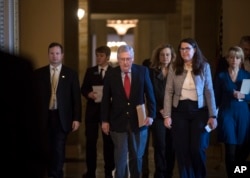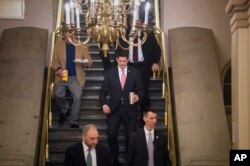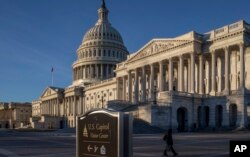Democrats and Republicans showed few signs of agreement Saturday, just hours after a funding bill was blocked in the Senate beginning a partial shutdown of the U.S. government. Spending authority expired at midnight Washington time, triggering a halt of non-essential functions.
Lawmakers are at odds over a range of defense spending and immigration issues, including a legislative fix for nearly 800,000 undocumented young people brought to the U.S. as children.
Senators resumed debate Saturday afternoon on a temporary spending bill that would fund the government through February 8. Democratic Senator Tammy Baldwin, however, objects to the continuing series of temporary spending bills, saying it "simply kicks the can down the road and fails to get the job done for the American people."
Republican Senator Lindsey Graham Tweeted Saturday afternoon, “I know it looks like a mess — but there are many senators of good will who want to solve the problem.” Graham thanked Democratic Senators “commitment to hard work and finding solutions last night.”
The U.S. House of Representatives stayed in session Saturday in the event the Senate negotiated a new continuing resolution that would require another vote. The bill would then head back to the Senate for a vote.
But neither side appeared to be in agreement on the terms for negotiating a new resolution.
“The President will not negotiate on immigration reform until Democrats stop playing games and reopen the government,” White House Press Secretary Sarah Huckabee Sanders said in a statement Saturday afternoon.
Trading blame
Earlier Saturday, the White House blamed Democrats for what it called the "Schumer Shutdown," accusing legislators of valuing illegal immigrants ahead of lawful Americans.
President Donald Trump tweeted Saturday morning "Democrats are far more concerned with Illegal Immigrants than they are with our great Military or Safety at our dangerous Southern Border. They could have easily made a deal but decided to play Shutdown politics instead."
Members of the House Republican leadership echoed the White House statement.
House Republican Speaker Paul Ryan said the Democrats would "do anything to appease their base, even shut down the federal government." He described the shutdown as a "dangerous political ploy" and "reckless."
But Democrats said the shutdown was the result of reckless behavior on the part of the president and Congressional Republican leadership.
“Happy anniversary, Mr. President. Your wish came true,” House Minority Leader Nancy Pelosi told reporters Saturday morning. “You won the shutdown. The shutdown is all yours.”
The first day of the shutdown comes on the one-year anniversary of President Trump’s inauguration. Many Congressional Democrats noted the president’s earlier Tweet calling for a “good shutdown” and said the president had stalled bipartisan talks on immigration reform.
“If you’re not for the Graham-Durbin proposal then tell me what you are for — put it in black and white. Because Goodlatte is a non-starter,” Rep. Luis Gutierrez, a Democrat from Illinois said of an immigration bill introduced by House Conservatives “They want to go out and pick everyone of the 11 million that are undocumented today, whether they present a risk to America or not.”
Earlier, lawmakers of both parties pointed fingers, as did as the president, who warned of repercussions from a shutdown and argued Democrats voted against funding the government as a political stunt to distract attention from the president’s economic accomplishments.
“Not looking good for our great Military or Safety & Security on the very dangerous Southern Border,” Trump tweeted. “Dems want a Shutdown in order to help diminish the great success of the Tax Cuts, and what they are doing for our booming economy.”
Democrat Tim Kaine countered that no one in his caucus “wants the government to shut down,” then quoted from a Trump tweet last year in which the president said America “needs a good ‘shutdown’”.
“There’s only one person that has talked about a shutdown with glee and with interest that it happen, and that’s the president,” Kaine said.
Agencies idling
Federal agencies, meanwhile, prepared to idle employees and halt major portions of their operations.
A meeting earlier Friday between Trump and the Senate’s top Democrat, Minority Leader Chuck Schumer of New York, failed to yield a breakthrough.
Democrats then followed through on pledges to vote down a Republican-crafted bill that would have funded the federal government through mid-February. The House of Representatives approved the bill Thursday with Republican-only votes.
Senate Democrats withheld support to press demands for congressional action on immigration and spending priorities, while insisting on an end to month-to-month government funding.
Republicans accused their Democratic colleagues of misplaced priorities.
“Millions of people, including our military, law enforcement and emergency personnel could lose their paycheck if Democrats follow through on their threat,” Senator John Cornyn of Texas said. “The time to stop playing games is now. We urge them [Democrats], we implore them: do not shut down the government.”
Trump and congressional Republicans repeatedly asserted that Democrats will be to blame if non-essential government operations come to a halt, a charge Democrats rejected.
“When you look across the spectrum of the three branches of government – the Republicans are in control,” Senator Dick Durbin, a Democrat from Illinois, said.
Democrats backed three previous short-term spending extensions late last year while bipartisan negotiations went forward on immigration and spending priorities. Last week, Trump rejected a bipartisan Senate immigration proposal, throwing congressional negotiations into disarray.
The U.S. government has shut down before, including in 2013, in a partisan deadlock over health care policy and funding. The shutdown lasted 16 days and furloughed hundreds of thousands of federal workers.
What stops and what continues during a federal shutdown varies, but federal research projects could be stalled, national parks closed, tax refunds delayed, processing of veterans' disability applications delayed, and federal nutrition programs suspended, as was the case in 2013.







